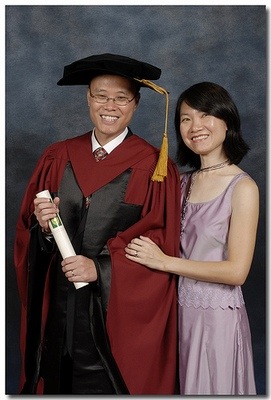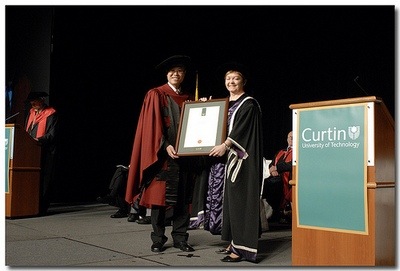 The Ph.D program finally came to a close when I received the scroll in Oct 2007. Yeah, my graduation got delayed by a year even though I’d submitted my thesis in Jan 2006. By the time I’d finished the usual revisions after the examiner’s remarks came back, then the Application to Graduate etc., I’d just missed the 2006 graduation’s ceremonies.
The Ph.D program finally came to a close when I received the scroll in Oct 2007. Yeah, my graduation got delayed by a year even though I’d submitted my thesis in Jan 2006. By the time I’d finished the usual revisions after the examiner’s remarks came back, then the Application to Graduate etc., I’d just missed the 2006 graduation’s ceremonies.
***
I once had a big debate with an old ACS friend of mine. This was about in 1993 I think. He was a PSC scholar and studying in Imperial College, and our dispute was over whether students are more liable to learn when they’re doing a program in NUS/NTU, or in an overseas institution.
He snorted in half derision when I said that I was learning a lot during my stay as an NTU student. He insisted that as an overseas student, he was far more likely to learn different things compared to the ‘limited’ opportunities of students studying at the local universities. He specifically cited ‘horse-riding’ as an experience that he believed one can’t get in Singapore.
Now that I’ve spent substantial time studying at the tertiary level both in Singapore and overseas, I have just a mite bit more informed opinion on the subject now than before – and my opinion today hasn’t changed from 16 years ago. I believe that as long as you’re willing to be open to new ideas and possibilities and try new things, you will learn as much studying in Singapore as in out of the country. Or in other words, a departure out of the country is not a prerequisite to learning.
 Or maybe it’s just my perception of learning. I’ve always found that some of the most meaningful lessons have stem from people, incidents that are just immediately around me.
Or maybe it’s just my perception of learning. I’ve always found that some of the most meaningful lessons have stem from people, incidents that are just immediately around me.
Work at the doctoral degree level, if nothing else, is expansive. Your world and perceptions opened up. You no longer merely accept things at face level. In everything, even something as an apparently innocuous statement, there are nuances. Learning isn’t merely about knowing, understanding or analyzing facts. It is about building relationships from facets of knowledge and extending upon them.
But all these things I believe was the product of the type of study as opposed to the physical environment I was in. If I’d done a similar Ph.D program in Zimbabwe, I’m pretty sure I would have learned too.
So what really did I learn in the program? Well, putting aside all the domain knowledge stuff on virtual worlds, game design, social behavior etc. for starters, I’m a better Microsoft Word user than before now! I had no idea how to use Styles for instance, or the Document Map. Or the Index generator. And I was too fond of direct formatting tags like CTRL-B, CTRL-I for bolding and Italicising. If one’s serious about properly processing a word document, those tags should never be used: one should be using only Styles.
I’ve also learned the incredible value of writing Simple English. Oh, I still revert to my long-winded self when I’m unconscious, but I’m a better language editor these days – though only if I’m working on a serious document: blog posts don’t count.:)
Lastly, if I were to be asked what I think is the single most important skill that’ll help someone else complete a Ph.D, it’d not be passion, hard work, interest, skill, competence etc. As important as those skills are, I’ve concluded it’s organization that’s the most critical skill one needs. As long as you naturally gravitate towards top-down decomposition of any complex problem you face into smaller constituents, or you naturally like to create plans for every project you do, you already have a leg up! :)
Recent comments